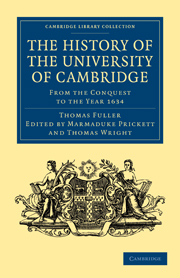Book contents
- Frontmatter
- THE EDITOR'S PREFACE
- HISTORY OF THE UNIVERSITY OF CAMBRIDGE SINCE THE CONQUEST
- Dedication
- PREFACE
- REVERENDISSIMO ANTISTITI, JACOBO USSERIO, ARCHIEPISCOPO ARMACHANO, Domino suo colendissimo
- SECTION II
- DOMINO GULIELMO PASTON, DE PASTON IN COM. NORF. EQUITI AURATO, Patrono meo colendissimo
- SECTION III
- ROULANDO LITTON, In pago Hertfordensi Armigero
- SECTION IV
- RADULPHO FREEMAN, In Comitatu Hertfordensi Armigero
- SECTION V
- EDV. BENLOSSIO, Armigero, Mecænati suo benevolo
- SECTION VI
- EDVARDO PALMER, DE WALTHAM ARMIGERO
- SECTION VII
- TO FRANCIS ASH, Of London, Esquire
- SECTION VII
- THOMÆ PLAYER Armigero, Camerarii Londinensis primogenito
- SECTION VIII
- A PRAYER
- INDEX
SECTION II
Published online by Cambridge University Press: 05 March 2012
- Frontmatter
- THE EDITOR'S PREFACE
- HISTORY OF THE UNIVERSITY OF CAMBRIDGE SINCE THE CONQUEST
- Dedication
- PREFACE
- REVERENDISSIMO ANTISTITI, JACOBO USSERIO, ARCHIEPISCOPO ARMACHANO, Domino suo colendissimo
- SECTION II
- DOMINO GULIELMO PASTON, DE PASTON IN COM. NORF. EQUITI AURATO, Patrono meo colendissimo
- SECTION III
- ROULANDO LITTON, In pago Hertfordensi Armigero
- SECTION IV
- RADULPHO FREEMAN, In Comitatu Hertfordensi Armigero
- SECTION V
- EDV. BENLOSSIO, Armigero, Mecænati suo benevolo
- SECTION VI
- EDVARDO PALMER, DE WALTHAM ARMIGERO
- SECTION VII
- TO FRANCIS ASH, Of London, Esquire
- SECTION VII
- THOMÆ PLAYER Armigero, Camerarii Londinensis primogenito
- SECTION VIII
- A PRAYER
- INDEX
Summary
The king's intentions to fortify Cambridge.
A. D. 1266. 50 Hen. III.
Heavy were the times now and tumultuous betwixt the king and his barons, mutually taking cities and castles one from another. The king therefore came to Cambridge (the pass out of the west into Norfolk and Suffolk) resolving to fortify the same. Indeed we find some ancient writings which may probably insinuate Cambridge to be walled time out of mind: as where we read in a charter of privileges granted to the town, “extra muros burgi de Cantabrig.” Except some will be so morose to expound it only the the walls of private houses therein. However, at the present such walls (if any) are utterly decayed.
Ditch made: wails meant.
Liber Barnwellens., Polydor. Virgil., et Leland.
2. The north-west part of Cambridge beyond the river (formerly farther extended than now of days) the king found sufficiently secured by an impregnable castle. The west side of the town was competently fenced with the river, anciently (before all endeavours of draining the fens) wider and deeper than now it is. Only the south and east of the town lay open, which the king intended to fortify. In order whereunto he built two gates, Trumpington-gate by St. Peter's Church, now ruined, on the south; Barnwell-gate, by St. Andrew's Church, now decayed, on the east. And because gates without walls are but compliments in matter of strength, he intended to wall the town about, if time had permitted him.
- Type
- Chapter
- Information
- The History of the University of CambridgeFrom the Conquest to the Year 1634, pp. 40 - 95Publisher: Cambridge University PressPrint publication year: 2009First published in: 1840

